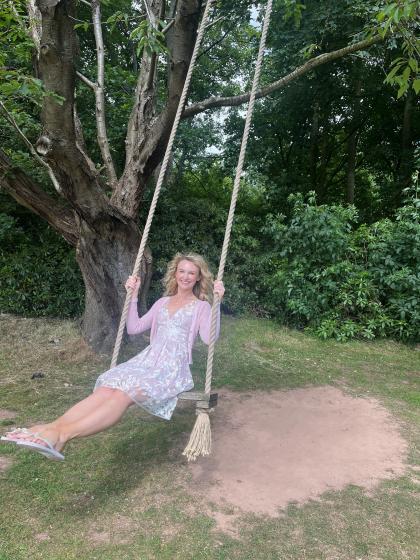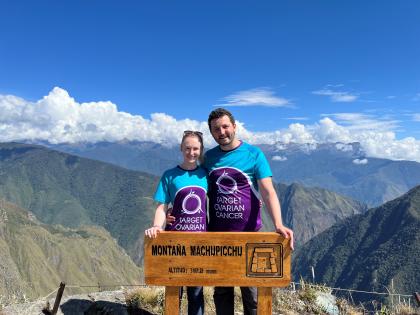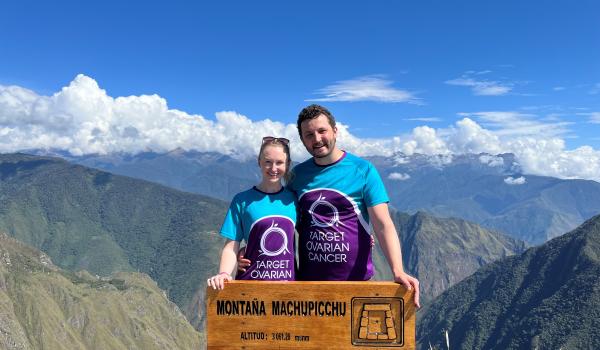At the height of the Covid-19 pandemic, I thought things couldn’t get any worse. I was working as a GP in an understaffed and unsupported practice. When I got home, I would share the challenges of each day with my then fiancé (a hospital doctor, also on the front line).
Throughout this dreadful time, the thought of our wedding kept us going and we finally tied the knot in July 2021. I was 31, my husband was 37 and we felt we were at a good point in our lives to start our family, so I stopped taking my contraceptive pill, which I’d been taking for around 16 years. We dreamed of being parents and hoped that it would happen for us soon.
Three months after stopping the pill, I was still waiting for my first period. I was taking pregnancy test after test, but they were all negative. I hadn’t had any previous health problems and otherwise I felt well, so I had no reason to suspect that anything sinister might be going on.

When I went to see my GP, a colleague who I very much look up to and trust, to talk about the work-related stress I was experiencing, I mentioned off-hand that my periods hadn’t come back after stopping the pill.
We also talked about a slight change in my bowel habit which we thought might be to do with stress-related irritable bowel syndrome (IBS) type symptoms.
We discussed doing some blood tests. It seemed early to have them, but my GP thought it was best for reassurance, and I trusted her.
They showed that my hormone levels were very abnormal, so we repeated them, as well as doing a CA125 blood test, which is used to detect if there is a possibility of ovarian cancer, along with other conditions. The CA125 came back as normal, but the hormones had risen even further.
Panic stricken
My GP spoke to gynaecology, and they recommended repeating the hormone blood tests in a few more months. Instead of taking their advice, my GP sent me for a pelvic ultrasound scan.
When I attended the appointment, I wasn’t expecting anything significant to be found. I remember looking at the sonographer – her face fell the moment she started the scan, and I knew immediately that something wasn’t right.
The morning after the scan, I was at work seeing my patients when I received an unexpected call from my GP, asking me to come in to see her.
She explained that I had a 16-centimetre, malignant looking mass occupying most of my pelvis, that appeared to originate from my right ovary. I was stunned and panic stricken.
I was referred to gynae-oncology and over the next few days I faced a myriad of CT scans, MRI pelvis, more blood tests, clinics, telephone calls.
The pelvic radiologist felt that the mass was almost certainly malignant; it had features in keeping with a granulosa cell tumour (GCT) originating from my right ovary, a rare type of ovarian cancer.
Even though I’m a doctor, I’d never heard of GCTs. These couple of weeks were the hardest; not knowing what was going on or what the plan was, all the while aware that my pelvis was full of cancer that was growing day by day.
Every twinge made me question what was happening. It was so hard to imagine that something so large was inside my body – I hadn’t put on any weight or experienced any bloating (a key symptom of ovarian cancer), but it was explained to me that it may have been growing slowly over the past couple of years.
Fertility sparing surgery
My gynae-oncologist gave me the options between full pelvic clearance, or a staged approach, starting with ‘fertility sparing surgery’ by removing the tumour with one ovary and tube, and then returning for ‘completion surgery’ at a later date.
I had always pictured myself as a mother, and never imagined that I would find myself having to make this kind of decision. I remember looking at my husband with tears in his eyes as I told my gynae-oncologist that I would accept the potential risk of death in order to choose the ‘fertility sparing’ approach.

The thought of potentially not being able to have biological children was devastating.
This all happened a couple of weeks before Christmas, at the height of the next surge in Covid-19 cases, and the emergence of the Omicron variant in South Africa, where my parents were on holiday.
I had to tell them over a video call that I’d been diagnosed with cancer and I was due to undergo major surgery. They flew home but couldn’t see me as we all had to self-isolate.
Isolation
After my surgery, I understood how isolating it was being an inpatient during the pandemic.
Women giving birth in the same hospital could have their partners with them on the ward, so why couldn’t my husband visit me on the gynaecology ward after major cancer surgery? I desperately wished I was in their shoes instead.
I was told that the mass had been a granulosa cell tumour of my right ovary and that it appeared to have not yet spread (stage 1A).
My left ovary was unaffected. I was extremely fortunate to have been diagnosed prior to the tumour rupturing or spreading locally. A large proportion of GCTs are diagnosed at stage 1C or above. I was told that I wouldn’t need any further treatment right away, only close monitoring. I felt numb.
While I was recovering from the laparotomy, my thoughts turned again to fertility preservation, in case of future recurrence. I underwent a round of IVF in February 2022 as an attempt to freeze embryos.
Unfortunately, we had poor results. I felt that every way I turned, my dream of having a biological child seemed further away. I felt so isolated.
Insights as a GP
As a GP and someone with an ovarian cancer diagnosis, I feel that I can now truly empathise with patients facing uncertainty, stress, pain, hopelessness and desperation. It’s been truly insightful.
With this in mind, I’ve tried to focus on the positives since my diagnosis and the way in which I can use my unique experience as both a doctor, and a cancer patient, to help others.
I’ve been fundraising for Target Ovarian Cancer through various events, including hiking to Machu Picchu, doing the National 3 Peak Challenge, organising Zumbathons, dance workshops, bake sales and talks at local businesses. I’ve raised over £10,000.

I hope that by sharing my story, it may help others to suspect the diagnosis, even in young, apparently healthy women like myself, who have no family history of breast or ovarian cancer.
If my GP had followed the existing NICE guidelines and not listened to her gut, I’d have likely been in a much less fortunate position than I am now.
I will be forever grateful to her for thinking outside of the box.
If you’ve been affected by this story and would like to speak to a specialist nurse, you can call our dedicated support line on 020 7923 5475 or contact us: [email protected]. We're open from 9am until 5pm, Monday to Friday.
If reading this story has helped you, join the Ovarian Cancer Community to connect with more people affected by ovarian cancer: www.targetovariancancer.org.uk/onlinecommunity



